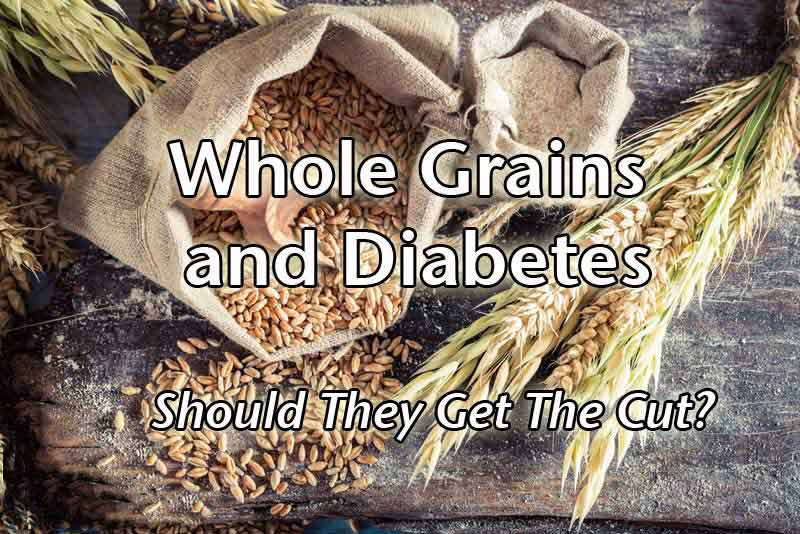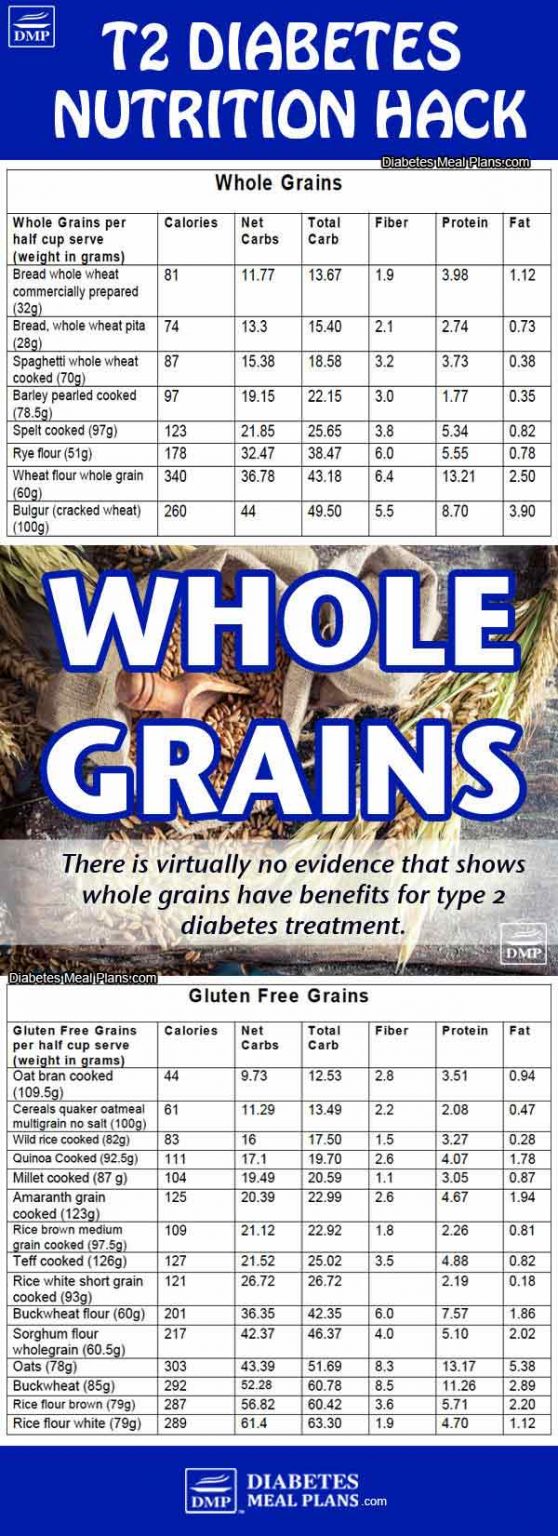Table of Contents[Hide][Show]
Whole grains are often recommended as a ‘safe’ diabetic food and yet are they?
Well I could give you my opinion but it would be just that, my opinion – which at the end of the day doesn’t stand up to much.
So in my usual style I decided to search the web and the medical journals to see what evidence really exists for recommending whole grains to type 2 diabetics – I’m always learning too.
In today’s post on whole grains and diabetes I’m going to present a few different views and the research that currently exists.
As usual it gets my back up when I start reading things. The amount of bad and wrong information, the lies and deception – well at least that’s how I think of it.
I encourage you to read the whole post because I’d like to hear your perspective on things once you read it.
Whole Grains vs. Refined Grains
Whole Grains
One of the easiest way to distinguish a whole grain is by it’s brown coloring, as compared to refined grains, which are white.
As the Minnesota Department of Health explains, the whole grain kernals are made up of 3 parts:
- Bran – Outer layer of the grain that contains fiber, antioxidants, B vitamins, phytochemicals, and 50-80% of minerals in grains like iron, copper, zinc, magnesium
- Endosperm – middle largest layer containing mostly carbohydrates, protein, and small amounts of some B vitamins and minerals
- Germ – inner component containing healthy fats, B vitamins, phytochemicals, and antioxidants like vitamin E
Refined Grains
Refined grains are all the white stuff – white pasta, white rice, white bread and so forth.
When you eat refined grains you are only getting the endosperm – the middle layer containing the highest carb count and the lowest nutrients.
Basically all of the nutrition has been stripped from the grain, which isn’t ideal because this means they have low vitamin and mineral content.
We need vitamins and minerals for many important functions in the body.
So if you are going to choose any type of grain, choose only whole grains.
But there is more to the story…
Reduced Risk vs. Treatment of Type 2 Diabetes

Study after study after study shows that whole grain intake is associated with reduced risk, prevention, decreased incidence of type 2 diabetes.
Without a doubt, you go searching through the medical journals and you’ll find plenty of research that suggests this.
BUT reduced risk is different to treatment.
Reduced risk generally means someone doesn’t yet have diabetes, treatment refers to how someone who already has diabetes can benefit.
I find many people use these terms interchangeably but they are completely different scenarios so you can’t just lump them into the same bucket.
Whole Grains Evidence
What does the Food and Drug Administration (FDA) think of the evidence behind whole grains and diabetes?
Here’s an excerpt I found on Today’s Dietitian:
When evaluating evidence for health claims, the FDA considers well-controlled clinical trials to be the gold standard for approval. For the whole grains and type 2 diabetes petition, the agency reviewed six such trials but found no significant association between whole grain consumption and fasting blood glucose or insulin resistance in five other studies. Most of the research on whole grains and type 2 diabetes has been observational in nature (ie, studies of populations, what they eat, and the incidence of disease). Of the 41 observational studies the FDA evaluated, the agency concluded that it couldn’t draw any conclusions for 38 because of inconsistencies in the way whole grains were defined and identified. Establishing an association between health and the consumption of any type of food is possible only if the food is clearly described and can be easily identified.
Overall, the FDA determined that only three observational studies and one intervention study supported an association between whole grains and a reduced risk of type 2 diabetes, while the others either found no association or provided inadequate definitions of the whole grain foods consumed in the study population.
However, after the FDA’s assessment, a systematic review and meta-analysis of whole grains and type 2 diabetes was published online in October 2013 in the European Journal of Epidemiology, which concluded that “our results support public health recommendations to replace refined grains with whole grains and suggest that at least two servings of whole grains per day should be consumed to reduce type 2 diabetes risk.”
Conclusion: The FDA finds poor evidence.
And again the evidence is all about reduced risk, not treatment.
Be on The Lookout For Rubbish Information
It annoys me no end to see rubbish articles like this, which are everywhere – written by a dietitian, someone that should have their facts straight.
The beginning of the articles says: YES, type 1 and type 2 diabetics should eat whole grains.
But it then goes on to give research based on reducing risk and how carbs are the thing that has the biggest impact on blood sugar – so… IT DOESN’T MAKE SENSE!
That’s just bad information in my opinion.
Are people actually thinking about this when they write things?
There’s simply no logic in it.
I just feel like people are insulting your intelligence. Seriously, if you had the right information would you work to change your diet?
I bet you would because you want to feel better.
Just because people do commonly consume grains doesn’t mean they have to. And it also doesn’t mean we should keep recommending it just because that’s what people commonly eat!
Diabetics want, and more importantly need to know what to eat to improve their health, period!
Sure, it’s tough to get to the bottom of it. But, can these dietitians and health organizations just stop regurgitating the status quo and present a properly constructed evidence based argument?
Anyway, now that I’ve said my bit, let’s get back on point.
Evidence Behind Whole Grains for Diabetes TREATMENT
There is VERY limited evidence that whole grains are actually good for diabetic treatment.
One study took 11 obese subjects (note these are not diabetic and 11 is a very small study). The people had hyperinsulinemia – meaning they had insulin resistance and were prediabetic. They did find that insulin was 10% lower in the whole grain diet compared to the refined grain diet (well it doesn’t take science to reach that conclusion).
Another common argument is that grains are low glycemic index (GI) and low GI helps diabetes.
Again, while that may be true to a certain extent, the reality is that the thing that influences your blood sugar and A1C the most is the amount of carbohydrate you eat.
Let’s repeat…
The thing that influences your blood sugar and A1C the most is the amount of carbohydrate you eat.
Anyway, I decided the best place to dig for more research was the highly regarded Cochrane Library.
The Cochrane Library is a medical journal that contains all the randomized control trials and highly regarded systematic reviews. Randomized trials are considered the highest form of evidence we have.
What I was looking for was research that shows whole grains actually have a benefit in treatment – not just in reducing risk.
Here’s the very limited evidence I found.
Research on Benefits for TREATMENT of Type 2 Diabetes
Study: 23 type 2 diabetic patients – the study looking at glycemic control and risk factors for cardiovascular disease in T2D.
Conclusion: “High-fiber cereal foods did not improve conventional markers of glycemic control or risk factors for CHD in type 2 diabetes over 3 months.” (1)
Study: 14 obese prediabetic people – comparing whole grain to refined grain.
Conclusion: “In conclusion, a WG diet reduces blood glucose by enhancing peripheral glucose uptake and pancreatic function in prediabetes independent of fat loss.” (2)
There were a couple of other studies showing slight benefits for obese people with metabolic problems – but these are not type 2 diabetics.
Overall conclusion: There is virtually no evidence that shows any benefit for consuming whole grains for treatment of type 2 diabetes!
If you know something I don’t please step forward with the info – I’d love to hear it, as I’m sure readers of this blog would too.
Whole Grains Are A Better Choice
For once the American Diabetes Association and I agree:
“There is no end in sight to the debate as to whether grains help you lose weight, or if they promote weight gain….
One thing is for sure. If you are going to eat grain foods, pick the ones that are the most nutritious. Choose whole grains. Whole grains are rich in vitamins, minerals, phytochemicals and fiber.”
THEY ARE HIGH CARBS.
Whole Grains and Diabetes
Please pin this infographic. 🙂

NOTE: If you want a copy of this list and lots of other carbohydrate foods, you can get it by joining our 30 Day Turnaround Program.
So…Should Whole Grains Get the Cut?
Some people can eat small portions (1/4-1/2 cup max) of whole grains without seeing too much of an impact on their blood sugar levels.
MOST people can’t get away with it and need to go grain free, cutting out pasta, rice, noodles, and so forth – at least high carb ones anyway.
At the end of the day it is your choice and your body, so test, test, test, and then work toward making better choices.
I know this comes as a shock to many people – I mean what are you going to eat if you can’t eat pasta and rice??
That’s why Diabetes Meal Plans is here. We’ve got a 30 Day Turnaround Program that takes you through all the foods step by step.
And we’ve also got ready-made meal plans to help make it easier.
Anyway, I hope this has given you some food for thought. 😉
Please share, pin, or tweet this post. Thanks 🙂
References
- Jenkins et al. 2002. Effect of wheat bran on glycemic control and risk factors for cardiovascular disease in type 2 diabetes.
- Mailin et al. 2014. Whole grain diet improves glucose tolerance, insulin sensitivity, and beta-cell function in overweight prediabetic adults.


My fasting level hangs out around 120. My physician says anything below 130 is good. I’m not really buying that. Fortunately, my levels do come down during the day between eating low carb and being active. So my question is how can I get that overnight fasting level down? Thanks.
That’s a great question Diana, and in a few days we will have some details and tips on that exact thing. Under 130 is considered the general goal, under 110 is better and under 100 is considered normal non-diabetic levels. The good thing is your levels are coming down and time in range is very important! Thanks for checking in and stay tuned for that info on morning levels.
Hi Checking in day 4
I don’t eat them because they raise the. B/S to much.
Yes, exactly Wendy!
When I was a kid in the 50s, our parents were told to give up pasta, rice, bread, potatoes in order to lose weight. Over the years, advice morphed into low fat instead. In 1985, I jumped on the low-fat bandwagon, thinking others knew more than I did. I packed on the pounds, fasting blood sugar creeping up over the years. Sad part is I knew in my gut carbs were bad for me as I’d dropped quite a bit of weight after college on a low carb diet, prior to the LF fad. So all of your articles, advice and recipes are very helpful. Toughest part has been transitioning to LC and realizing I really am okay (not hungry or feeling deprived) without them. The biggest surprise has been realizing that I have to be very careful about fruit as well.
It is really interesting to see (and hear firsthand) how nutrition information has changed over the years. I am happy you are finding something that works for you!
Great stuff on grsins. Now, what about fruits. The 3 fruits per day recommendation is a lot of carbs. Nd fructose sugar. Could you do same review on fruiys thst you did on grains.
You are right, Dave, that fruit is very high in fructose. We actually have previously written a guide on the best fruit for diabetics that I think will answer many of your questions. Make sure to watch your portion size of fruit, and probably sticking to one serving per day is a better goal. Let us know if you have any further questions!
HOW MUCH O
F CARBS IS GOOD DAILY
Thank you..
Find more on that here and here Sonia.
Egyptian folks are great people but their Wheat is not. After being a diabetic for almost 40 years, take my word WHEAT, the whole grain is the enemy of the diabetics. Do not go for it.
Thank you for all of the information you are providing. I am so happy to have found your site. Finally a nutritionist and dietitian who truly understand and provide helpful advice! I forwarded your site to the nurse in charge of diabetic research at the hospital I go to for treatment. Thank you!
Thanks for your kind words Kim and so glad you find our site helpful!